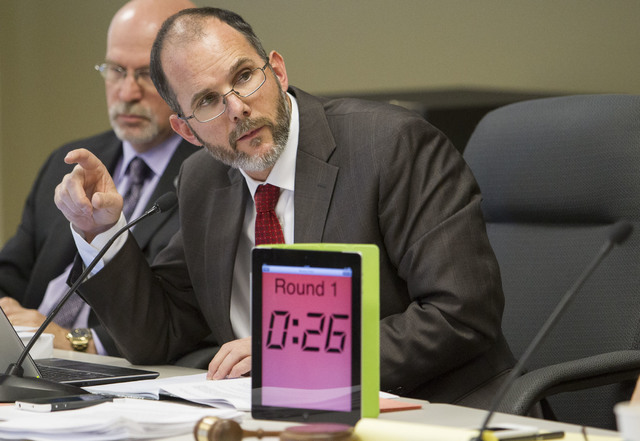Education chief warns US reps federal law could be chaotic for Nevada
State Superintendent of Public Instruction Steve Canavero warned members of a U.S. House of Representatives subcommittee Wednesday that proposed rules to implement a new federal education law could create chaos and confusion as Nevada schools try to help at-risk students.
Canavero, whose department oversees about 460,000 students, also testified during a nearly two-hour congressional hearing that a new accounting method in the draft regulations threatens a recently approved plan to drive more control over budget, instruction and staffing decisions to individual school communities.
“At its core, the plan shifts control from the central service of the district to each local school,” Canavero told the House subcommittee on early childhood, elementary and secondary education.
“For a number of reasons, it is unclear whether this plan would comply with the proposed … rule, so this locally driven effort could be stymied by the proposed rule,” Canavero added.
The hearing centered on the U.S. Department of Education’s proposed rules for the Every Student Succeeds Act, which President Barack Obama signed into law in December.
The regulations include a controversial requirement that changes how states and districts prove they spend federal funds fairly between schools with larger shares of disadvantaged students and those with more affluent populations. Republicans, oddly allied with the teachers union, have argued the rules will force the transfer of teachers within districts or local and state tax hikes to provide more resources to neighborhood schools.
Canavero also warned the proposal would fuel an emphasis on compliance over ensuring greater student outcomes.
“Any decision that affects spending — which we know is virtually all decisions — will have to be vetted through the district finance office for compliance checks,” he said. “This will affect everything from school hiring and purchasing to curriculum.”
Democrats, however, including U.S. Rep. Marcia Fudge of Ohio, countered that the regulatory proposal ensures equity for students who need it the most.
Scott Sargrad, director of K-12 education policy with the left-leaning Center for American Progress, also testified Wednesday and cited research from the federal department that found approximately 5,700 schools across the nation receive on average $44,000 less per year than wealthy schools in the same district.
“The intent of the law is to at least give every child a fighting chance (and) equal opportunity to succeed,” Fudge said.
“I just do not understand for the life of me why, if we give poor children their fair share, it’s a problem,” she added.
Canavero also suggested the regulations could encourage districts to cut expensive programs, such as magnet schools and career and technical education, that he said provide choice and opportunity for students who live in poverty.
That struck a chord with U.S. Rep. Joe Heck, the Republican candidate in Nevada’s U.S. Senate race. He did not attend Wednesday’s hearing but sits on the main education and workforce committee.
In a statement, Heck agreed with Canavero’s warning that the proposed rules could have “unintended consequences” to harm high-achieving career and technical academies in Nevada.
“We need to be supporting and expanding our successful (career and technical education) programs, not enacting regulations that may reduce their numbers,” the statement read.
A spokesman for Catherine Cortez Masto, the former Nevada attorney general and Heck’s Democratic opponent for the Senate, also provided a comment on Canavero’s testimony.
”Catherine Cortez Masto supports the bipartisan increase in education funding passed by Governor (Brian) Sandoval and the legislature that puts more resources into Nevada classrooms,” spokesman Zach Hudson said in an email.
Contact Neal Morton at nmorton@reviewjournal.com or 702-383-0279. Find @nealtmorton on Twitter.

















